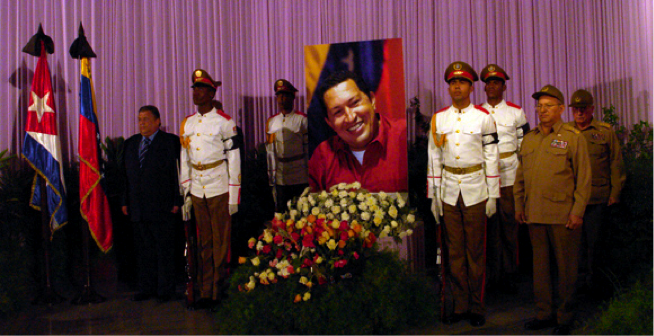Editor's Note: Riordan's full piece on strategic digital and public diplomacy is available here. Much has been written recently about digital diplomacy. But little gets beyond the use of social media to sell messages on...
KEEP READINGThe CPD Blog is intended to stimulate dialog among scholars and practitioners from around the world in the public diplomacy sphere. The opinions represented here are the authors' own and do not necessarily reflect CPD's views. For blogger guidelines, click here.
Is the export of the Bolivarian revolution on the verge of collapse?
There is most probably no left wing leader who had influenced public opinion inside and outside the Latin American part of the Western hemisphere to the same extent as the unconventional Venezuelan president Hugo Chavez had over the last decade. Doubtlessly, his death three weeks ago ended one phase of Venezuela’s political development. Now facing the caudillo’s loss, the electorate has to determine the sustainability of principal public diplomacy paradigms of the Chavez government.

Picture source: www.cubadebate.cu
The former president of Venezuela had been manufacturing strong support for his theory of 21st century socialism mainly by aiding the Cuban economy with petrodollars in exchange for sending medical experts to Venezuela. The so called Operación Milagro initiative helped the underprivileged Venezuelans solve their vision problems and tightened up the cooperation on both sides even more.
In relation to Venezuela’s northern neighbor, the powerfulness of its oil diplomacy reached its peak in 2006 when a campaign emphasizing corporate social responsibility was launched by a CITGO refiner operating in the United States. On the grounds of providing the low–income people with discounted heating oil, the petroleum corporation succeeded in reducing anti–Chavez sentiment considerably.
Furthermore, at the very early stage of his administration, Chavez became well aware of the fact that building a stronger engagement with left-leaning media was crucial for rooting his ideology in the consciousness of the public. As a result, regional television network TeleSur was made under Chavez’s auspices with its highly peculiar slogan Our North is the South (Nuestro Norte es el Sur). This step has clearly intensified the Latin American unification tendencies which are in general warmly welcomed by the masses. In April 2010, he went even further when he created an account on California-based social network Twitter, despite his speeches, which would underline the media corruption in capitalist countries.
Moreover, it is worth noting that, as announced a few days ago, the unscripted talk show Aló Presidente, which used to be aired each Sunday from the very first days of Chavez assuming power, is returning to TV screens. Either it is meant to serve as a Chavismo reminder for those who might soon turn a blind eye on their previously demonstrated loyalty to the leftist government and look the other way or it is just a manner of expressing honor and tribute to the longtime leader.
In either case, it will be very interesting to observe whether the fourteen-year-old diplomacy of Chavismo is predestined to survive even without its ideological constructor.
Visit CPD's Online Library
Explore CPD's vast online database featuring the latest books, articles, speeches and information on international organizations dedicated to public diplomacy.
POPULAR ARTICLES
-
January 29
-
January 20
-
January 28
-
February 6
-
January 8
Join the Conversation
Interested in contributing to the CPD Blog? We welcome your posts. Read our guidelines and find out how you can submit blogs and photo essays >.













